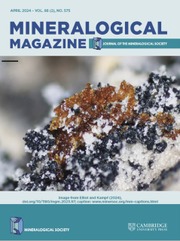Article contents
Stratiform magnetite crystals of abnormal morphology from volcanic carbonatites in Tanzania, Kenya, Greenland, and India
Published online by Cambridge University Press: 05 July 2018
Summary
Magnetite is common in carbonatites, and usually has octahedral habit. Abnormal crystals from Galapo, Tanzania, were long thought to be unique, but such crystals are now known to occur at seven localities in four countries. The magnetite is titaniferous, but not unusual in composition for its provenance. The abnormal crystals typically have large growth pyramids extending in one direction (occasionally in two or more directions). They appear to be formed by superimposition of macroscopic growth sheets, parallel to octahedral and other planes, giving a planar structure to the growth pyramid. The edges of the sheets may form low-index or more complex surfaces. Some sheets project beyond the bounding planes of the growth pyramid, which is not repeated in crystallographically equivalent orientations. This unusual mode of growth will be called stratiform. Recognition of these distinctive crystals elsewhere might reveal the presence of hitherto unsuspected carbonatites.
- Type
- Research Article
- Information
- Copyright
- Copyright © The Mineralogical Society of Great Britain and Ireland 1978
References
- 7
- Cited by


